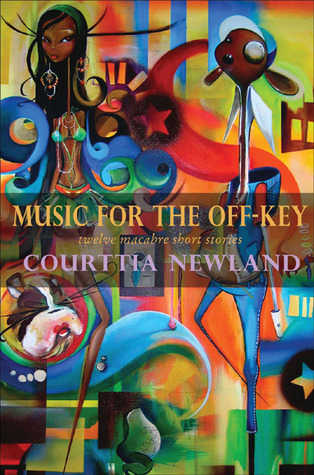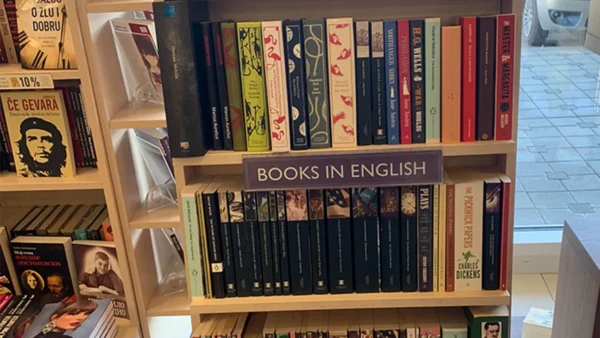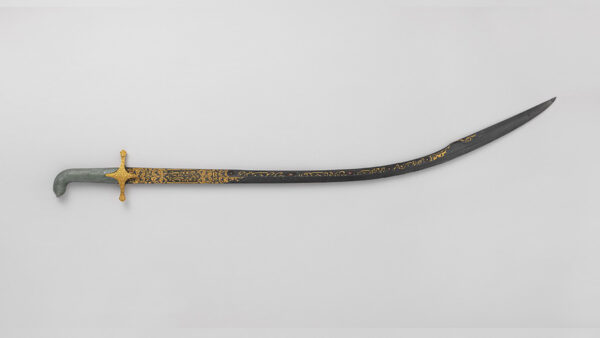I was excited to meet Courttia Newland at Bim Literary Festival here in Barbados earlier this year. He’s a British writer, but was here because his mother is Barbadian. I’d read his debut novel The Scholar when it first came out, which I now realise is a long time ago (like, last millennium). Had always planned to try another of his books but never got around to it, so I was happy to pick up this collection of “twelve macabre short stories”, and get it signed.
First of all I should say that, despite the subtitle, the stories weren’t really macabre in the way I understand the word. There’s not a lot of real horror in there, and while there are a couple of deaths, they’re not really described in a gruesome way.
A much better description is in the title itself: the stories are most definitely off-key. They’re peopled by the sad, the lonely, the desperate and the misunderstood. Sample characters include a paedophile who lacks the courage to kill himself, a homeless man who steals from the one person who’s trying to help him, and an expert doll maker who gets a little too attached to one of her creations.
There’s also some magical realism in a few of the stories: a council-estate rude boy who starts to grow wings, a boy who can heal people by touching them, a child who wishes ill on his bullies and discovers his fantasies come true. Other stories are more realistic, gritty tales of young people caught up in gang violence. And there’s one featuring white racists screaming abuse from a car, and another on the complexities of complexion.
The end result is a collection of stories of very varied style and tone, a collection that resists easy definition (which is maybe why Newland or his publisher settled on the unsatisfactory “macabre”). The variety is so great, in fact, that the collection comes perilously close to being incoherent, but is just about held together by that word “off-key”. Despite the different writing voices and the varied subject matter and even the very varied lengths, the one thing that binds these stories together is that they are all off-key. There’s a wonderful quote in the front of the book from Marvin Gaye:
These can’t be the only notes in the world. There have to be other notes someplace, in some dimension, between the cracks of the piano keys…
That’s what this book is about – delving into the cracks, finding people in there who normally get passed over, sometimes falling down the cracks altogether and ending up in a weird dimension where kids on council estates sprout wings. The variety in the stories means that everything feels fresh and you never know quite what to expect. For me it worked really well, and I was impressed by the experimentation with different forms. The Scholar was quite a hit back in the day, so it would have been easy for Newland to make a successful career out of producing a string of similar books to appeal to the same audience. It’s good to see an author refusing to do that, and instead writing what he wants to write.
There’s a note at the end in which Newland explains some of his influences, and also some of what he’s trying to escape from:
Too often I feel, as Black writers in the UK, we are trapped within the walls of three subjects – the Windrush Novel, the Gangster Novel and the I’m-not-really-Black novel … I’ve always thought that there’s no point being an artist if you’re not going to push boundaries with your art. I hope I’ve managed to achieve that aim with this collection.
To me, yes, the book achieved its aim. It doesn’t blast away any boundaries with any radically new forms or subject matter, but it does nudge them open a little wider, and that’s enough for a book in my opinion. I’m looking forward to seeing what Courttia Newland does next – he has a novel, The Gospel According to Cane, out in February. He read an extract at Bim Literary Festival which I liked in a weird kind of way, and said the book was about a woman whose son is abducted at eight months old, and what happens when a man turns up twenty years later claiming to be that long-lost child. Sounds intriguing!
On a side note, don’t you just love the cover? It’s by Anissa-Jane.





There are 12 comments
Hi Andrew,
I have just republished my book ‘The Silk Peacock’, which was in print form, as an ebook.
I would be delighted if you wanted to read it and write a review. I can send you the MS to an email address by attachment. It is a very varied assortment of short stories! I understand of course if you are too busy.
Best Wishes,
Hilary West
[email address removed]
Hi Hilary
Thanks for the offer – sure, I’d love to take a look. Will send you an email…
Despite the weirdness of it, the cover’s awesome, I would definitely pick it up if I saw it in the shop. It does sound like lot of variety, though I can see how there could be a thread joining them all together in the way collections are. I like the idea of writing about people who are often passed over, short stories tend to delve into the little details, but they also tend to concentrate on the trials of popular characters, people.
It is awesome, isn’t it? I saw it on a table full of books at Bim Literary Festival and it really stood out. Yes, the variety definitely worked for me, and I liked that the off-key theme tied it all together.
Though I have never read Courttia Newland this one sounds good. I love quirky and offbeat stories and I often enjoy the magical realism style. You wrote – “delving into the cracks, finding people in there who normally get passed over”. This also makes this sound like I book that I would want to read as I feel that I am often happily surrounded by such people!
Yes, there are some interesting people in those cracks, aren’t there? This does sound as if it would be for you – hope you enjoy it if you do end up reading it! Would like to hear what you think of it.
Great review, it certainly sounds like the kind of book I would like to read. Any favorite stories?
The cover is very beautiful, it reminds me of children’s books.
Hmm, I always struggle to decide on a favourite. But I liked the doll story, called Smile Mannequin, Smile. It was a weird and playful story about obsession.
This sounds like a collection I’d like.
The cover is great. For some reason the description and the one title (Smile Mannequin) made me think a bit of Hotschnig but I guess Hotschnig is truly macabre.
Yes, I can see why you’d think of Hotschnig. I remember the doll story from his collection, very unsettling! They’re actually quite different in style, and I think you’re right that Hotschnig is more truly macabre.
How interesting. I think short story collections are really tricky. I prefer a cohering voice myself, or some sort of clear theme (although I like the way you turn to the off-key here and interpret it in such rich ways), but I am a fan of the uncanny. How did you find the writing? I will forgive just about anything to a writer who can turn a gorgeous sentence.
The writing was really strong – sorry, just realised I didn’t quote anything except from the essay at the back. But yes, it was good. If I can dig out the book again I’ll post an excerpt to give you an idea. It’s inaccessible right now, though – just moved to a new flat and things are a little crazy…